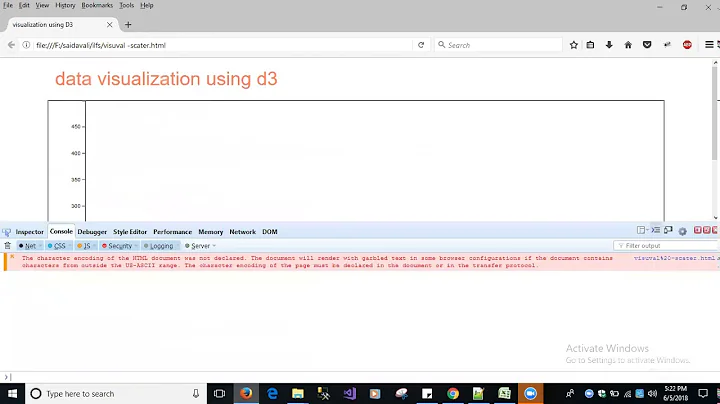How to read in CSV with d3 v4?
Solution 1
There is some misunderstanding here: you're confusing d3.csv, which is a request, with d3.csvParse, which parses a string (and also mixing D3 v3 syntax with D3 v4 syntax). This is the difference:
d3.csv (D3 v4)
The d3.csv function, which takes as arguments (url[[, row], callback]):
Returns a new request for the CSV file at the specified url with the default mime type text/csv. (emphasis mine)
So, as you can see, you use d3.csv when you want to request a given CSV file at a given url.
For example, the snippet below gets the CSV at the url between quotes, which looks like this...
name, parent
Level 2: A, Top Level
Top Level, null
Son of A, Level 2: A
Daughter of A, Level 2: A
Level 2: B, Top Level
... and logs the parsed CSV file, check it:
d3.csv("https://gist.githubusercontent.com/d3noob/fa0f16e271cb191ae85f/raw/bf896176236341f56a55b36c8fc40e32c73051ad/treedata.csv", function(data){
console.log(data);
});<script src="https://d3js.org/d3.v4.min.js"></script>d3.csvParse
On the other hand, d3.csvParse (or d3.csv.parse in D3 v3), which takes as arguments (string[, row]):
Parses the specified string, which must be in the delimiter-separated values format with the appropriate delimiter, returning an array of objects representing the parsed rows.
So, you use d3.csvParse when you want to parse a string.
Here is a demo, suppose you have this string:
var data = "foo,bar,baz\n42,33,42\n12,76,54\n13,42,17";
If you want to parse it, you'll use d3.csvParse, not d3.csv:
var data = "foo,bar,baz\n42,33,42\n12,76,54\n13,42,17";
var parsed = d3.csvParse(data);
console.log(parsed);<script src="https://d3js.org/d3.v4.min.js"></script>Solution 2
You can get csv data into d3 like the following -
// get the data
d3.csv("data.csv", function(error, data) {
if (error) throw error;
console.log(data);
//format data if required...
//draw chart
});
Solution 3
I also could not get the d3.csv("csv_file.csv", function(data) { //modifying code } to work.
A classmate recommended using the following, which has worked so far:
d3.csv("data.csv").then(function(data){
//modifying code
}
As noted in the comments below, this is a fix if you're running v5 instead of v4.
Solution 4
Use d3.csv("data.csv", function(data){...}) to get CSV from url and parse, or use d3.csv.parse() to parse a CSV-formatted string.
Related videos on Youtube
ocean800
Updated on November 21, 2021Comments
-
ocean800 over 2 years
I'm just having a little trouble understanding the documentation for CSV Parse with D3. I currently have:
d3.parse("data.csv",function(data){ salesData = data; });But I keep on getting the error:
Uncaught TypeError: d3.parse is not a function
What is this supposed to look like? I'm just a little confused, and the only examples that I could find was something like this.
I also tried something like:
d3.dsv.parse("data.csv",function(data){ salesData = data; });and got:
Uncaught TypeError: Cannot read property 'parse' of undefined
Why is this happening? Any help would be greatly appreaciated, thanks!!
-
 Gerardo Furtado about 6 yearsSince the method has the same name but different signature in D3 v5 I added "v4" in the question's title, to make it clear for future readers and avoid unnecessary mistakes: this Q/A does not apply for v5.
Gerardo Furtado about 6 yearsSince the method has the same name but different signature in D3 v5 I added "v4" in the question's title, to make it clear for future readers and avoid unnecessary mistakes: this Q/A does not apply for v5.
-
-
 tsando about 6 yearsit seems the above syntax suggested for d3 v4 has now changed in v5 and the above no longer returns the data object, but rather each element of the object
tsando about 6 yearsit seems the above syntax suggested for d3 v4 has now changed in v5 and the above no longer returns the data object, but rather each element of the object -
 Gerardo Furtado about 6 years@tsando, indeed, as I already answered here. I just edited the title to make this clear.
Gerardo Furtado about 6 years@tsando, indeed, as I already answered here. I just edited the title to make this clear. -
altocumulus almost 5 yearsThe question explicitly asked for v4, whereas your change is necessary only when using v5. Although your answer is correct for the latest version it somehow misses the question. I recommend you consider deleting it.
-
ocean800 almost 5 years@altocumulus while thats true, I think it's possible that someone using a later version will stumble upon my question and could use this answer. Would have been better to include this was for v5 of course, though. Thanks for the clarification.





